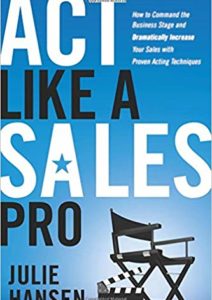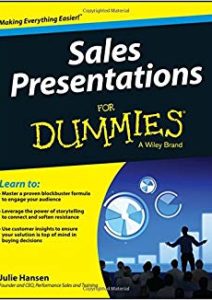Sales role-play can be an extremely valuable tool for helping reps internalize product knowledge and adopt new skills – when it’s done well. Too often however sales role-play is merely an awkward, high-pressured test of a rep’s ability to regurgitate back what they think is expected of them. Instructions are vague. Direction is unclear. Ultimately reps learn very little. Except that they hate to role-play.
If only there was a better way…
Acting-based Role-play
Role-play has been used for hundreds of years in theaters and acting studios around the world. Directors and stage managers have learned a few things during this time about how to use role-play to get better performances out of actors when they take the stage. By applying a few directing tips to your sales role-play, you can dramatically improve your team’s performance on the business stage as well.
Here are the 5 tips from directors that will dramatically improve your sales role-play:
1. Set manageable objectives
Traditional role-play tries to accomplish too much, and usually ends up achieving very little. Choose specific goals for your role-play. Directors don’t give actors feedback on their entire performance at the first rehearsal. They give them specific, manageable objectives. For example, one rehearsal they just focus on getting the lines down. The next they focus on blocking, etc.
In the same way, limit the number of goals for your sales role-play to one or two. Instructions like, “Focus on incorporating our new value proposition into the conversation and making better eye contact,” are manageable goals that help reps master a new skill before moving on to the next.
2. Create a specific scenario
Traditional sales role-play often feels like the actor’s nightmare of being thrust on stage without knowing his lines or even what play he’s in.
Reps rarely go into a sales call blind, so don’t throw them into a role-play without enough information to work with. Provide a clear set of specific circumstances to help reps ground themselves in the “reality” of the situation and block out distractions.
For example, instead of vague instructions, like “You’re meeting with the VP of sales,” try, “You’re meeting with a VP of sales for a small software company in the market for a new CRM solution. He’s agreed to give you fifteen minutes and wants to know why his team will use your solution when they’re not using their current one (brand x).”
3. Prepare the customer
Good directors know that every role – no matter how small – contributes to the overall performance. Yet in sales, little (if any) direction is given to the person playing the customer. Taking on the role of the customer is a challenge for most reps because they have the curse of knowledge. You can help this rep step into the customer’s shoes by providing them with a specific scenario or buyer persona. This should describe what the customer does know about your product or service, what his current challenge or goal is, and what he hopes to get out of the meeting. The more authentic the customer, the more authentic the rep’s performance will be as well.
4. Allow the rep time to “get into role”
Actors need a few moments to “get into role,” in other words, to focus on the specifics of the scene and what they expect to accomplish or encounter in it. Give your reps this same advantage. Providing them with the scene details well ahead of the role-play, in addition to giving them a few minutes right before to mentally prepare, reduces anxiety and sets reps up for success.
5. Foster a safe environment
The goal of rehearsal is to practice and internalize new skills. In order to do so actors – and reps – must feel safe enough to take chances as they try new things. It’s helpful to tell reps you are taking off your manager’s hat and that this is a rehearsal, not a judged performance.
Review the objectives of the role-play and when it’s time to offer feedback, honor your rep’s trust and courage by keeping your feedback focused on those objectives. Avoid labeling things “right and wrong” instead, note where there may be more effective choices. If there are additional areas to work on, plan follow-up sessions to focus on those.
Adopting a few directing tips may not make your reps learn to love role-play, but they will learn how to perform more effectively when they step onto the business stage. And that deserves a round of applause!
What kinds of successes have you had with sales role-play? Leave us a comment and tell us about it.
Pipeliner CRM provides all needed information for creating customer roles. Get your free trial of Pipeliner CRM now.












Comments